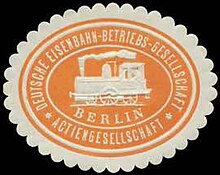German railway operating company

The Deutsche Eisenbahn-Betriebs-Gesellschaft (DEBG) was a stock corporation that was founded on November 15, 1898 in Berlin . The founders were the railway construction and operating company Vering & Waechter , Doertenbach & Co and Mitteldeutsche Creditbank .
Acquisition of branch lines
DEBG immediately took over the management of twelve branch lines with a length of 184 km from Vering & Waechter. This included seven railways owned by other people in all parts of the German Reich, but these were given up again in the course of the following years. a. also the narrow-gauge Gernrode-Harzgeroder railway in the Harz . The remaining five became the property of DEBG in 1898/99; four of them were in the state of Baden . The Saarlouis tram also belonged to the company from 1899.
After the turn of the century, the focus of business activity shifted even more clearly to the south-west of the empire. DEBG built another four railways in Baden and three in Alsace - Lorraine , which, however, were lost again after the First World War in 1919/20.
The loss of the routes in Alsace-Lorraine was offset by the acquisition of the five railways of the Badische Lokal-Eisenbahn-Gesellschaft (BLEAG) on December 22nd, 1931. This increase of 131 km of routes was the highest of 264.5 km plus the 32 km of the VEE reached.
At the beginning of the Second World War, DEBG owned the following branch lines in what was then the state of Baden:
- Achertalbahn
- Alb Valley Railway
- Busenbach – Ittersbach railway line
- Bruchsaler Bahnen = Katzbachbahn and Kraichtalbahn
- Bühlertal Railway
- Ettlinger Seitenbahn
- Harmersbachtalbahn
- Jagst Valley Railway
- Kandertal Railway
- Münstertalbahn
- Neckarbischofsheim – Hüffenhardt
- Oberschefflenz-Billigheim
- Orschweier-Ettenheim Minster
- Railway line Wiesloch – Meckesheim / Waldangelloch
In northern Germany, in the Prussian province of Hanover and the neighboring state of Braunschweig, only the small railway Voldagsen-Duingen-Delligsen was owned by DEBG. There in the Weserbergland she also ran the Vorwohle-Emmerthaler Eisenbahn-Gesellschaft , the majority of which she had acquired in the meantime. The main workshop of all DEBG railways in Bodenwerder-Linse, which was also responsible for the Baden railways, belonged to the VEE.
Development after the Second World War
Due to the demarcation of the zone after the Second World War, the DEBG did not lose any railways, since all were in the western zones and thus in the Federal Republic that was later founded. Nonetheless, the declining demand for transport on branch lines prompted DEBG to withdraw from rail operations.
In 1956/57 it sold the electrified Albtalbahn lines , which led from Karlsruhe to the northern Black Forest , to the state of Baden-Württemberg , which it incorporated into the newly founded Albtal-Verkehrs-GmbH. The city of Karlsruhe became its sole shareholder.
After passenger traffic on the Bühl – Oberbühlertal branch line was discontinued at the end of the year 1956, freight traffic also ended there in autumn 1958. On May 1, 1963, the DEBG brought the ten railways still remaining in Baden-Württemberg into the newly founded state-owned Südwestdeutsche Eisenbahn-GmbH .
In 1968 DEBG also sold the branch line Voldagsen-Duingen-Delligsen. In the meantime the dissolution of the company had begun, which was completed in 1970. The rail operations of the Vorwohle-Emmerthaler Eisenbahn-Gesellschaft were continued from May 1st, 1967 by a rescue company, the Vorwohle-Emmerthaler Verkehrsbetriebe GmbH .
literature
- Meinhard Döpner: The Deutsche Eisenbahn-Betriebs-Gesellschaft AG. Gülzow 2002

